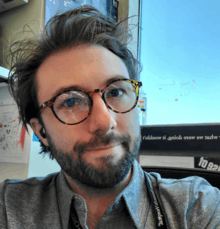Bradlee Heckmann
Bradlee L. Heckmann is an American biologist and neuroimmunologist who currently holds the John H. Sununu Endowed Fellowship[1] in Immunology at St. Jude Children's Research Hospital. Dr. Heckmann's research is focused on understanding the regulation of inflammatory processes in the central nervous system, with particular emphasis on neurodegenerative diseases including Alzheimer's Disease[2] and the role of the autophagy machinery in this setting.
Bradlee L. Heckmann | |
|---|---|
 | |
| Born | |
| Nationality | United States |
| Other names | Brad Heckmann |
| Alma mater | Mayo Clinic College of Medicine and Science University of Kentucky |
| Scientific career | |
| Fields | Neuroimmunology Autophagy Alzheimer's Disease |
| Institutions | St. Jude Children's Research Hospital |
| Thesis | The function and regulation of the G0/G1 Switch Gene 2 |
| Doctoral advisor | Jun Liu |
| Other academic advisors | Douglas R. Green Edmund B. Rucker, III |
| Website | www www |
Education
Dr. Heckmann graduated from Lexington Catholic High School in Lexington, Kentucky prior to attending the University of Kentucky where he graduated with a Bachelor of Science in Biology. Dr. Heckmann went on to complete his doctoral training in Biochemistry & Molecular Biology at the Mayo Clinic College of Medicine.[3] After completing his formal training he joined the laboratory of Dr. Douglas R. Green at St. Jude as a postdoctoral fellow.[4]
Research
After studying lipid metabolism and components that regulate lipid turnover while at Mayo Clinic, Dr. Heckmann switched his research focus to evaluating the role and regulation of non-canonical autophagy in the brain.[5][6] These studies ultimately led to Heckmann & Green's discovery of a novel form of the endocytic trafficking pathway.[7] Heckmann and Green showed that a protein known as LC3 which helps facilitate vesicle trafficking and fusion, most well known for its role in autophagy, was attached to endosomes that contained β-amyloid,[7] a known contributor to Alzheimer's Disease establishment and pathology in humans. As such they named the discovery LC3-associated endocytosis (LANDO).[8][9][10] They further found that inhibition of LC3-associated endocytosis in microglial immune cells of the brain resulted in impaired recycling of cell receptors that recognize β-amyloid, leading to dramatic increases in inflammatory activation.[7]
Heckmann and Green were the first to show that loss of the LC3-associated endocytosis pathway in microglia greatly exacerbated the disease pathology of Alzheimer's Disease and that the LANDO pathway is protective against β-amyloid induced neuroinflammation and neurodegeneration, work recently published in Cell[7] and featured in mainstream media.[11][12][13][9][10][8]
The potential for therapeutically targeting LC3-associated endocytosis for the treatment of devastating conditions including Alzheimer's Disease and cancer is of significant promise.[8]
Recognition & Awards
Dr. Heckmann has received multiple awards and honors stemming from his work primarily on LC3-associated endocytosis as well as mainstream media coverage.[14][15][16] He has been the recipient of honors including a Ruth L. Kirschstein National Research Service Award, an Aegean Young Investigator Award, an LRP award from the National Cancer Institute, and an Excellence in Science Award and nomination for Prize in Neurobiology from the American Association for the Advancement of Science.[17][18]
He also has been elected as a member of the Sigma Xi Research Honor Society.
External links
References
- ORCID. "Bradlee L. Heckmann (0000-0002-3271-7183)". orcid.org. Retrieved 2020-04-01.
- Heckmann, Bradlee L.; Tummers, Bart; Green, Douglas R. (January 2019). "Crashing the computer: apoptosis vs. necroptosis in neuroinflammation". Cell Death & Differentiation. 26 (1): 41–52. doi:10.1038/s41418-018-0195-3. ISSN 1476-5403.
- "The function and regulation of the G0/G1 Switch Gene 2 (G0S2) - ProQuest". search.proquest.com. Retrieved 2020-04-01.
- "Postdoctoral Fellows". www.stjude.org. Retrieved 2020-04-01.
- Heckmann, Bradlee L.; Green, Douglas R. (2019-03-01). "LC3-associated phagocytosis at a glance". Journal of Cell Science. 132 (5). doi:10.1242/jcs.222984. ISSN 0021-9533. PMID 30787029.
- Heckmann, Bradlee L.; Boada-Romero, Emilio; Cunha, Larissa D.; Magne, Joelle; Green, Douglas R. (2017-11-24). "LC3-Associated Phagocytosis and Inflammation". Journal of Molecular Biology. 429 (23): 3561–3576. doi:10.1016/j.jmb.2017.08.012. ISSN 0022-2836. PMC 5743439.
- Heckmann, Bradlee L.; Teubner, Brett J. W.; Tummers, Bart; Boada-Romero, Emilio; Harris, Lacie; Yang, Mao; Guy, Clifford S.; Zakharenko, Stanislav S.; Green, Douglas R. (2019-07-25). "LC3-Associated Endocytosis Facilitates β-Amyloid Clearance and Mitigates Neurodegeneration in Murine Alzheimer's Disease". Cell. 178 (3): 536–551.e14. doi:10.1016/j.cell.2019.05.056. ISSN 0092-8674.
- Jefferson, Robin Seaton. "Newly Discovered Cellular Pathway May Mean New Approach For How We Treat Alzheimer's And Cancer". Forbes. Retrieved 2020-04-01.
- Hospital, About The Author Mary Powers Mary Powers is a member of the Communications Department at St Jude Children’s Research (2019-07-25). "Lando: Star Wars smuggler or possible ally against Alzheimer's disease?". St. Jude Progress Blog - St. Jude Children’s Research Hospital. Retrieved 2020-04-01.
- "Gently Used: Can Recycled Microglia Receptors Prevent Plaque? | ALZFORUM". www.alzforum.org. Retrieved 2020-04-01.
- "New Research Discovery - Alzheimer's and Toxicity Pathways". BioSpace. Retrieved 2020-04-01.
- "LANDO Found to be Key to Microglial Clearance of Amyloid-β and Neuroinflammation". Fight Aging!. 2019-07-05. Retrieved 2020-04-01.
- "Pathway discovered that prevents buildup of Alzheimer's protein". www.stjude.org. Retrieved 2020-04-01.
- "July 24, 2019". UsAgainstAlzheimer's. Retrieved 2020-05-01.
- "Bradlee L. Heckmann | Cell Journalist | Muck Rack". muckrack.com. Retrieved 2020-05-01.
- "LC3-associated endocytosis: guarding against neuroinflammation & neurodegeneration". LabRoots. Retrieved 2020-05-01.
- "Aegean Conferences". www.aegeanconferences.org. Retrieved 2020-05-01.
- Heckmann, Bradlee. "Regulation of microglial induced inflammation by non-canonical autophagy". Cite journal requires
|journal=(help)